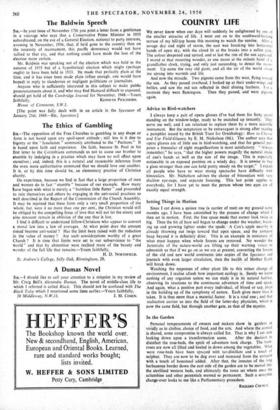Setting Things in Motion
Since I cut down a quince tree (a carrier of rust) on my ground some months ago, I have been astonished by the process of change which I then set in motion. First, the free space made that corner look twice as big. Then the bit of bare soil began to change under the weather, break- ing up and growing lighter under the spade. A Cox's apple near-by is already throwing out twigs toward that open space, and the compost heap beyond it is definitely? drier. This is an example in miniature of what must happen when whole forests are removed. No wonder the Jeremiahs of the nature-world are lifting up their warning voices to admonish us that if we go on as we are at present, converting the forests of the old and new world continents into copies of the Spectator and journals with even larger circulation, then the health of Mother Earth will break down.
Watching the responses of other plant life to this minor change of environment, I realise afresh how important ecology is.- Surely we know nothing of any organism unless we can study it in its natural habitat, observing its reactions to the continuous adventure of time and space. And again, what a positive part every individual, of blood or sap, plays in the building up of the symphony of nature. Each gives more than it takes. It is thus more than a material factor. It is a vital one ; and that realisation carries us into the field of the latter-day physicists, which is now the same field, but through another gate, as that of the mystics.














































































 Previous page
Previous page